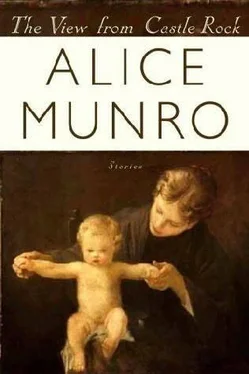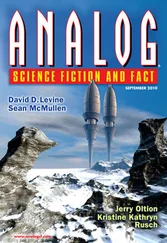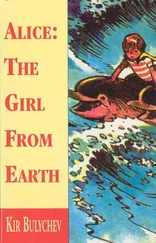I had not known that scrubbing the office floor every night was one of the watchman’s duties. (This does not mean that my father had deliberately kept quiet about it-I might not have been listening.) I was surprised, because I had never seen him doing any work of this sort before. Housework. Now that my mother was sick, such work was my responsibility. He would never have had time. Besides that, there was men’s work and there was women’s work. I believed this, and so did everybody else I knew.
My father’s scrubbing apparatus was unlike anything anybody would have at home. He had two buckets on a stand, on rollers, with attachments on either side to hold various mops and brushes. His scrubbing was vigorous and efficient-it had no resigned and ritualistic, feminine sort of rhythm. He seemed to be in a good humor.
He had to come and unlock the door to let me in.
His face changed when he saw it was me.
“No trouble at home, is there?”
I said no, and he relaxed. “I thought you were Tom.”
Tom was the factory manager. All the men called him by his first name.
“Well then. You come up to see if I’m doing this right?”
I gave him the message, and he shook his head.
“I know. I forgot.”
I sat on a corner of the desk, swinging my legs up out of his way. He said he was nearly finished here, and that if I wanted to wait he would show me around the Foundry. I said I would wait.
When I say that he was in a good humor here, I don’t mean that his humor around home was bad, that he was sullen and irritable there. But he showed a cheerfulness now that at home might have seemed inappropriate. It seemed, in fact, as if there was a weight off him here.
When he had finished the floor to his satisfaction he hooked the mop to the side and rolled the apparatus down a slanting passageway that connected the office with the main building. He opened a door that had a sign on it.
Caretaker.
“My domain.”
He emptied the water from the buckets into an iron tub, rinsed and emptied them again, swished the tub clean. There on a shelf above the tub among the tools and rubber hose and fuses and spare windowpanes was his lunch bucket, which I packed every day when I got home from school. I filled the thermos with strong black tea and put in a bran muffin with butter and jam and a piece of pie if we had any and three thick sandwiches of fried meat and ketchup. The meat was cottage roll ends or baloney, the cheapest meat you could buy.
He led the way into the main building. The lights burning there were like streetlights-that is, they cast their light at the intersections of the passageways, but didn’t light up the whole inside of the building, which was so large and high that I had the sense of being in a forest with thick dark trees, or in a town with tall, even buildings. My father switched on some more lights and things shrank a bit. You could now see the brick walls, blackened on the inside, and the windows not only painted over but covered with black wire mesh. What lined the passageways were stacks of bins, one on top of the other higher than my head, and elaborate, uniform metal trays.
We came on an open area with a great heap of metal lumps on the floor, all disfigured with what looked like warts or barnacles.
“Castings,” my father said. “They haven’t been cleaned yet. They put them in a contraption called a wheelabrator and it blasts shot at them, takes all the bumps off.”
Then a pile of black dust, or fine black sand.
“That looks like coal dust but you know what they call it? Green sand.”
“ Green sand?”
“Use it for molding. It’s sand with a bonding agent in it, like clay. Or sometimes it’s linseed oil. Are you any way interested in all this?”
I said yes, partly for pride’s sake. I didn’t want to seem like a stupid girl. And I was interested, but not so much in the particular explanations my father began to provide me with, as in the general effects-the gloom, the fine dust in the air, the idea of there being places like this all over the country, in every town and city. Places with their windows painted over. You passed them in a car or on the train and never gave a thought to what was going on inside. Something that took up the whole of people’s lives. A never-ending over-and-over attention-consuming life-consuming process.
“Like a tomb in here,” my father said, as if he had picked up some of my thoughts.
But he meant something different.
“Compared to the daytime. The racket then, you can’t imagine it. They try to get them to wear earplugs, but they won’t do it.”
“Why not?”
“I don’t know. Too independent. They won’t wear the fire aprons either. See here. Here’s what they call the cupola.”
This was an immense black pipe which did have a cupola on top. He showed me where they made the fire, and the ladles used to carry the molten metal and pour it into the molds. He showed me chunks of metal that were like grotesque stubby limbs, and told me that those were the shapes of the hollows in the castings. The air in the hollows, that is, made solid. He told me these things with a prolonged satisfaction in his voice, as if what he revealed gave him reliable pleasure.
We turned a corner and came on two men working, stripped to their pants and undershirts.
“Now here’s a couple of good hard working fellows,” my father said. “You know Ferg? You know Geordie?”
I did know them, or at least I knew who they were. Geordie Hall delivered bread, but had to work in the Foundry at night to make extra money, because he had so many children. There was a joke that his wife made him work to keep him away from her. Ferg was a younger man you saw around town. He couldn’t get girls because he had a wen on his face.
“She’s seeing how us working fellows live,” my father said, with a note of humorous apology. Apologizing to them for me, for me to them-light apologies all round. This was his style.
Working carefully together, using long, strong hooks, the two men lifted a heavy casting out of a box of sand.
“That’s plenty hot,” my father said. “It was cast today. Now they have to work the sand around and get it ready for the next casting. Then do another. It’s piecework, you know. Paid by the casting.”
We moved away.
“Two of them been together for a while,” he said. “They always work together. I do the same job by myself. Heaviest job they’ve got around here. It took me a while to get used to it, but it doesn’t bother me now.”
Much that I saw that night was soon to disappear. The cupola, the hand-lifted ladles, the killing dust. (It was truly killing-around town, on the porches of small neat houses, there were always a few yellow-faced, stoical men set out to take the air. Everybody knew and accepted that they were dying of the foundry disease, the dust in their lungs.) Many particular skills and dangers were going to go. Many everyday risks, along with much foolhardy pride, and random ingenuity and improvisation. The processes I saw were probably closer to those of the Middle Ages than to those of today.
And I imagine that the special character of the men who worked in the Foundry was going to change, as the processes of the work changed. They would become not so different from the men who worked in the factories, or at other jobs. Up until the time I’m talking about they had seemed stronger and rougher than those other workers; they had more pride and were perhaps more given to self-dramatization than men whose jobs were not so dirty or dangerous. They were too proud to ask for any protection from the hazards they had to undergo, and in fact, as my father had said, they disdained what protection was offered. They were said to be too proud to bother about a union.
Читать дальше












